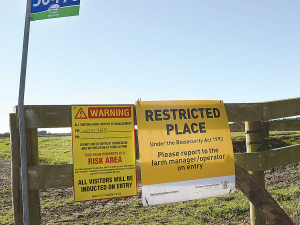MPI Hails Kiwifruit Boom as Horticulture Revenue Surges Past $9 Billion
Ministry for Primary Industries (MPI) Director General Ray Smith is giving a big shout-out to the horticulture sector, especially kiwifruit.
 A provincial declaration that New Zealand is free from Mycoplasma bovis could be made in October or November.
A provincial declaration that New Zealand is free from Mycoplasma bovis could be made in October or November.
A major milestone on New Zealand's unique journey to eradicate Mycoplasma bovis could come before the end of this year.
A provincial declaration that the country is free of Mycoplasma bovis may be made in either October or November, says Ministry for Primary Industries (MPI) director-general Ray Smith.
Speaking at the Primary Industries NZ Summit in Christchurch last week, he says the eradication of M. bovis has been "a real success story".
"So, if you were involved in that in any way, you have our deepest understanding of how difficult it is to have someone turn up on your farm one day and say, 'actually putting a notice on it, you're going to stop what you're doing until we clean this up'," says Smith.
"About 300 farmers had that experience. But we haven't had this disease turn up for two years now."
Smith says NZ has achieved something the rest of the world said couldn't be done.
"We spent $750 million getting to this point, industry and government both contributing to solving that problem. We're almost there.
"We'll see, if we get through this spring, which is the risky period, by October, November, we'll declare provisional freedom of absence of Mycoplasma bolus in New Zealand. And that's a great thing. To not have to live with lameness, aborted calves and mastitis related problems in our animals is a good thing to have achieved."
The M. bovis programme, jointly funded by the Government and farmers, started in 2018 and should finish by 2018.
Under the programme, we need to pass through three phases to provide confidence that M. bovis is absent in cattle herd - delimiting phase to identify and remove cases of infection and provisional absence - focussing on monitoring the cattle population through background surveillance. There needs to be two consecutive clear springs and two consecutive clear autumn calving periods to build up a good level of confidence that M. bovis is no longer present.
The third phase is confidence of absence. In this phase, background surveillance continues until the industry achieves a very high level of confidence that M. bovis is eradicated. This phase is expected to run for two years. The confidence of absence phase ends with a statement of absence and M. bovis is then considered exotic.
Pāmu has welcomed ten new apprentices into its 2026 intake, marking the second year of a scheme designed to equip the next generation of farmers with the skills, knowledge, and experience needed for a thriving career in agriculture.
One team with 43 head, including a contingent from Mid Canterbury, are reflecting on a stellar NZ DairyEvent.
Fonterra farmer shareholders have approved the mechanism for a $2/share capital return expected from the sale of its global consumer and associated businesses.
Trainees in the horticulture industry studying towards a certificate or diploma can now apply for Horticulture New Zealand's (HortNZ) 2026 Industry Training Scholarships programme.
OPINION: The first three Global Dairy Trade (GDT) auctions have been a morale booster for farmers.
Former Fonterra executive Alex Turnbull has been appointed CEO to lead all five Yili Oceania Business Division companies in New Zealand.

OPINION: Here w go: the election date is set for November 7 and the politicians are out of the gate…
OPINION: ECan data was released a few days ago showing Canterbury farmers have made “giant strides on environmental performance”.